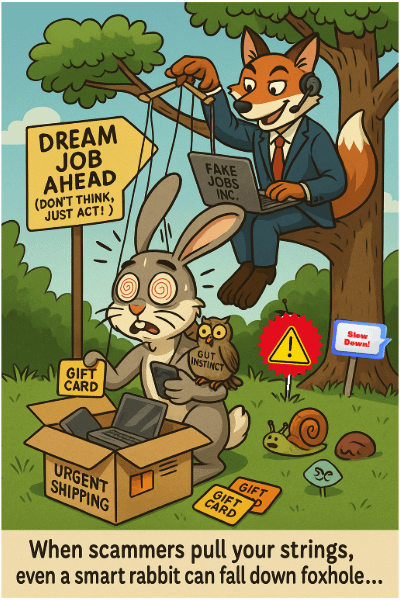
True Fraud Story #001: Strings Attached
The truth is, there are many different F Words, but the one I want to shine a light on today is fraud, specifically employment fraud that targets good people with good hearts.
When a job offer feels too good, or too fast, to be true, it probably is. A recent employment fraud scam pulled out all the stops: real employee names, spoofed phone numbers, fake interviews, and a whirlwind hiring process that left no time for second-guessing. Who has time to slow down and spot red flags when a so-called “opportunity” moves faster than a caffeine-fueled recruiter?
Here’s the truth: scammers are hijacking real company identities, using LinkedIn profiles and fake interviews to lure in job seekers, convincing victims to buy expensive tech and send it straight to them. They dressed up their story with real places and even faked credentials on platforms like Microsoft Teams, making it nearly impossible to sniff out the lies at first glance.
The Too-Good-to-Be-True Job Offer
Let’s call out the elephant in the inbox: job offers that move at hyper speed are rarely legit. Scammers love pressing the “urgent” button. One day you’re casually checking emails, the next you’re “interviewed,” “hired,” and buying expensive tech before you can blink.
Consider this timeline: an email arrives, the interview happens the next day, and within hours, the applicant is fast-tracked without any references or background checks. When a new employer acts more desperate than you are to get started, that’s not enthusiasm, it’s a red flag waving in your face.
Wanting It So Bad You Miss the Red Flags
Here’s where it gets real. Sometimes you want the job so badly, it clouds your radar. That emotional desire can drown out every little warning bell ringing in the back of your mind. You start rationalizing the weird stuff, the rushed interview, the strange payment requests, the urgency. Your gut might whisper, “This feels off,” but your heart shouts, “What if it’s real?”
That internal tug-of-war is exactly what scammers exploit. They’re counting on your hope to be louder than your hesitation. And if you’ve tied the opportunity to a cause close to your heart? That’s fuel for the fraud.
Weaponizing Real People and Companies
Fraudsters know that trust is currency. So, they borrow credibility by impersonating real professionals and legit companies, building LinkedIn-ready profiles faster than you can say “phishing.” It’s not just a fake name; they’ll even use up-to-date job titles and public profiles to sell the illusion.
In this case, scammers leveraged a real employee’s name from a reputable mental health platform, pairing it with a fake director, both complete with believable LinkedIn presences. To the victim, it looked bulletproof. But these profiles were just decoys, digital masks designed to bypass skepticism.
Mirroring Legitimate Processes
These fraudsters didn’t stop at emails. They scheduled phone interviews, set up a Microsoft Teams account, and used remote work as the perfect cover. The target was told to buy an iPhone and a MacBook Pro, then ship them to a supposed “tech team” at a fake company address to be “loaded with secure software.” It only unraveled when the promised tech never arrived.
Meanwhile, red flags mounted. The victim was pressured into buying Apple gift cards to “pay the tech team,” a clearly suspicious request that slipped past under stress. Emotional pressure and urgency were the scammer’s greatest tools.
The Emotional Setup
She had years of professional hiring experience, yet this scam still ensnared her because it spoke directly to her heart. It was sophisticated with real-looking onboarding documents, official letterhead, and even a personnel handbook. But the scammers weren’t just after her money, they targeted her trust, her empathy, and her desire to do meaningful work.
The Final Blow
After spending thousands on equipment and gift cards, facing delays and empty promises, she finally refused further purchases until the tech arrived. That’s when scammers made a final request: an additional $7,000. The same day, one reimbursement check bounced, leaving her responsible for over $4,000. Thankfully, she halted the second check just in time.
Immediate Steps She Took:
- Reported the scam to the State Police, FTC, and FBI
- Froze her credit
- Locked her Social Security number
- Preserved every piece of evidence
Unfortunately, she discovered there was no single resource guiding victims clearly through what steps to take, adding frustration to the crisis.
The Courage to Speak Up
Sharing her story isn’t easy, it takes remarkable courage. Many people stay silent after being targeted, weighed down by shame or fear of judgment. But by bravely speaking out, this fraud fighter has empowered others, offering critical insights and raising awareness so fewer people fall prey to sophisticated scams. Her willingness to come forward helps break the cycle of silence and isolation that scammers count on.
Protecting Yourself: Trusting Your Gut
Scammers excel at faking credibility, but your intuition is stronger than any forged LinkedIn profile. Spotting employment scams often means recognizing uneasy moments and knowing what to do when instincts flash red.
Watch for:
- Fast turnaround (less than 48 hours from contact to job offer)
- Skipped hiring steps (references, background checks)
- Pressure to act fast
- Requests to buy and ship tech or gift cards
- Interviews without video
If your gut is waving red flags, pause and independently verify. Call the real HR department, Google “Company Name + Scam,” screenshot everything, and report your experience immediately.
Above all, don’t blame yourself. These scams are sophisticated by design. Your voice could save someone else from becoming a victim.
Fraud doesn’t take a day off, and neither should your awareness. If something feels off, trust your instincts before your wallet gets dragged into a scam. Because the only F word we’re not saying around here is fooled. Let’s stay alert, stay loud, and ensure no one else walks this road alone.
Sharing what happened isn’t just brave, it helps someone else spot the same trap.
Got a story of your own?
📩 Send it to tips@thetruthaboutthefword.com

Leave a Reply
You must be logged in to post a comment.